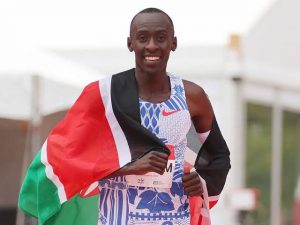Devendra Jhajharia, who recently turned 40 years old, has once again proved that age is just a number.
At the age of eight, Jhajharia’s left hand was amputated after coming in contact with a high-power electric wire while climbing a tree in his village Churu, Rajasthan. Jhajharia was called “weak” by his friends after the mishap. It was then he picked up the javelin to fight that label.
“I heard so many things as a kid,” Jhajharia said. “I wouldn’t be allowed to enter the ground. They used to laugh at me, joke about me, saying ‘tera ek haat hi nahi hai, throw kaise karega (You don’t have one hand, how will you throw)?” he added.
But with his one hand, Jhajharia has gone on to become India’s most decorated Paralympian in history. He is the only Indian with three individual gold medals in either the Olympics or the Paralympics, as he added a silver to his two gold medals in the F46 category at the Tokyo 2020 Games.
Jhajharia’s gold medals came at the 2004 Athens and 2016 Rio Paralympic Games. Both were world record throws — 62.15m in Athens and 63.97m in Rio.
Also Read | Tokyo Paralympics: Yogesh Kathuniya wins silver in discus throw final
Jhajharia eyed a third ahead of departing for Tokyo, and looked set to breach his record as he touched 65.71m during a national selection trial in New Delhi. It swelled his eyes with tears, bringing back memories of his father, who passed away in October last year, standing tall beside him against those who belittled his aspirations.
“It was my first competition without the presence of my father, so when I did that without him watching, I got very emotional,” Jhajharia said.
Also Read | Tokyo Paralympics: India’s Avani Lekhara wins gold in women’s 10m air rifle
It was also his first competitive event in more than a year. The 2020 lockdown forced him to remain in his village for around five months, during which all he could do was a bit of weight training using old dumbbells and empty gas cylinders, exercising with car tyres and shadow throwing with a rusted javelin.
Jhajharia returned to the Sports Authority of India centre in Gandhinagar in July. In November, the novel coronavirus struck him.
“I’ve never been away from my javelin for as long as I have in the last year or so. Battling COVID was a challenge. I gained weight being inactive, and have shed 7kgs after getting back to training,” he said.
Also Read | History-maker Bhavina Patel says Sachin Tendulkar is her inspiration
Jhajharia, with almost two decades of competing at the top level with two Paralympic gold medals to show, could well have given himself a pat on the back and hung up his boots.
With Tokyo Paralympics in the front, Jhajharia has to evolve in his mind and body from 2004 to 2021; from being a rookie fresh out of college in Athens to a seasoned campaigner in Rio to India’s most successful Paralympian expected to deliver his best
With Jhajharia, who became the first para athlete to be conferred the Khel Ratna award in 2017, is once again at the forefront of it.
Also Read | How an accident led Canada’s 2016 Olympian to a Paralympic medal
“In 2004 before heading to Athens, there was only one person who came to send me off at the airport: my father. Today, the Prime Minister is speaking to me and my family before I go to Tokyo. I feel like the entire country is behind me,” Jhajharia said.
However, what hasn’t changed is a promise. Before the Rio Paralympics, Jhajharia told his daughter that he’d come back home with a gold medal. He kept his word then. He wants to keep his word now.






